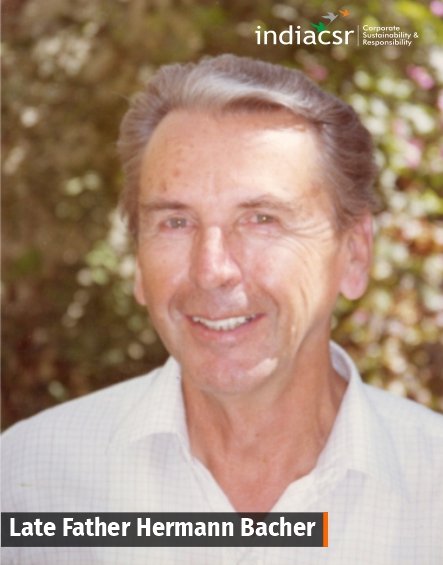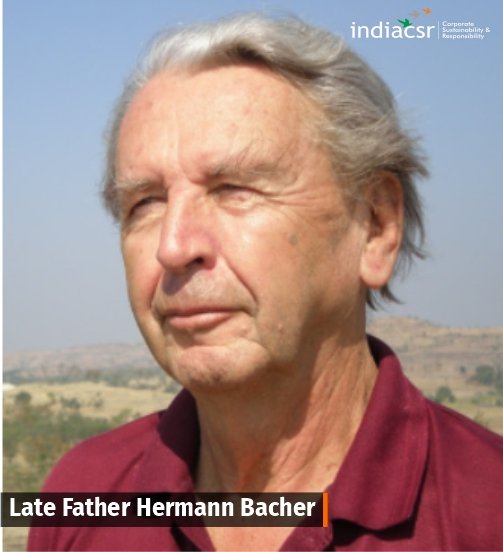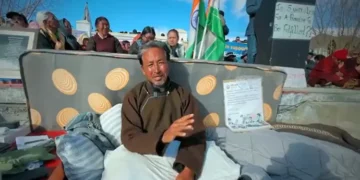Lovingly known as ‘Bacher Baba’ (12th October 1924 – 14th September, 2021) launched the Indo-German Watershed Development Programme (IGWDP) that covered the states of Maharashtra, Andhra Pradesh, Gujarat, and Rajasthan to conserve and sustainably manage water resources
Father Hermann Bacher, the Father of community-led Watershed Development in India passed away on Tuesday 14th September 2021 at his hometown in Switzerland. He was 97 years old. Father Bacher who spent 60 years in India, launched the Indo-German Watershed Development Programme (IGWDP) in Maharashtra to conserve and sustainably manage water resources in drought-prone areas. The programme went on to cover the states of Andhra Pradesh, Gujarat, and Rajasthan, while the concepts and pedagogy of the IGWDP have been replicated by NABARD across more than 6 million acres in 19 states/UTs impacting millions of lives.
The Programme was supported and funded by the governments of India, Maharashtra and Germany and was implemented by NABARD, WOTR and various NGOs.
In 1993, Father Bacher founded WOTR (Watershed Organisation Trust) a Pune based non-profit organisation that engages at the intersection of practice, knowledge and policy across scales and in collaboration with stakeholders from across sectors. He was born in Switzerland and later on he moved to Maharashtra. He dedicated his life to welfare of rural communities and natural resources by identifying drought prone areas and initiating watershed management projects in various villages. Father Bacher was widely regarded and respected as a true ‘man of God’ for his selfless service of the poor who called him ‘Bacher Baba’.
Expressing grief on the demise of Father Bacher, Crispino Lobo, Managing Trustee of WOTR, said, “Father Hermann Bacher has left us with an irreparable loss. He will always be remembered for his immense contribution to rural development, watershed management and poverty eradication in Maharashtra.Through his remarkable journey he motivated innumerable youngsters to support and work for upliftment of rural communities and channelize their passion towards them.He will be our source of motivation to keep on working for the cause he dedicated his life to.”
Known as the ‘Father of people-led watershed development’ in India, Father Bacher ensured involvement of local communities in each project and for smooth implementation of various activities by putting equal emphasis on social and technical aspects. He brought villagers, panchayats, government, elected representatives, funders and all stakeholders on the same platform and inspired them to work in synergy for rural development.
He also introduced the ‘Sangamner Pattern’ which promoted collaboration among all the stakeholders through a pooling of resources and the acquisition of a sense of ownership of the process and programme.He was a pioneer of the ‘ridge-to-valley’ approach of treating a watershed in a systematic manner across the entire landscape of the village, beginning from the top. Father Bacher also laid the foundations for the establishment of the Watershed Development Fund at NABARD by the Government of India in 1999.

In recognition of his outstanding efforts, Fr. Bacher was given Germany’s highest civilian award, the Federal Cross of the Order of Merit in 1994 at a ceremony in the watershed village of Mendhwan in Sangamner. He was also honoured with’ Krishi Bhushan’ by the Maharashtra Government. The State Government conferred upon him and WOTR its highest Award in agriculture, ‘The Dr. Punjabrao Deshmukh Krishi Ratna’. In 2017, the UNCCD awarded WOTR the prestigious ‘Land for Life Award 2017’ instituted by the United Nations Convention to Combat Desertification (UNCCD).
Watershed Organisation Trust (WOTR) is a globally recognised organisation dedicated to transforming the lives of millions of poor villagers across India through participatory watershed development and ecosystems restoration, climate resilient sustainable agriculture, integrated and efficient water management and climate change adaptation, with a special emphasis on building resilience of vulnerable communities, farmers, and women.
WOTR was established in 1993 and is headquartered in Pune, Maharashtra, India.As on March 2021, WOTR, in collaboration with its partners, has worked in over 5,200 villages across 9 Indian states – Maharashtra, Telangana, Andhra Pradesh, Madhya Pradesh, Rajasthan, Jharkhand, Bihar, Chhattisgarh and Odisha. It has impacted more than 4.3 million people, trained over 530,000 people from across India and 63 countries, collaborated with 230 NGOs/ Project Implementing Agencies (PIAs), and promoted over 15,500 SHGs involving 190,000 women.





























